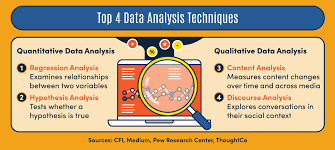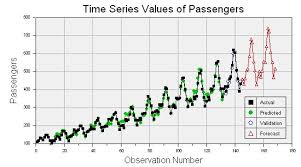The Role of Data Analysis Tools in Research
In the realm of research, data analysis plays a crucial role in interpreting and deriving meaningful insights from vast amounts of data. With the advancements in technology, researchers now have access to a wide array of data analysis tools that streamline the process and enhance the accuracy of their findings.
Types of Data Analysis Tools
There are various types of data analysis tools available to researchers, each designed to cater to specific needs and requirements. Some common types include:
- Statistical Software: Programs like SPSS, R, and SAS are commonly used for statistical analysis, hypothesis testing, and regression modelling.
- Data Visualization Tools: Tools like Tableau and Power BI help researchers visualise complex data sets through graphs, charts, and interactive dashboards.
- Machine Learning Platforms: Platforms such as TensorFlow and scikit-learn enable researchers to build predictive models and uncover patterns within their data.
- Text Analysis Tools: Tools like NVivo and QDA Miner aid researchers in analysing qualitative data such as text documents or interviews.
The Benefits of Using Data Analysis Tools
Utilising data analysis tools in research offers several benefits, including:
- Efficiency: These tools automate repetitive tasks, saving researchers time and effort in analysing large datasets.
- Accuracy: By employing sophisticated algorithms, these tools can identify patterns and trends that may not be apparent through manual analysis.
- Insightful Visualisations: Data visualization tools help researchers present their findings in a clear and compelling manner, making it easier for others to understand complex information.
- Predictive Capabilities: Machine learning platforms enable researchers to develop predictive models that can forecast future trends based on historical data.
In Conclusion
Data analysis tools have revolutionised the research landscape by empowering researchers with powerful capabilities to analyse data more effectively. By leveraging these tools intelligently, researchers can unlock valuable insights that drive innovation and further our understanding of the world around us.
Advantages of Data Analysis Tools in Research: Enhancing Accuracy, Efficiency, and Insight
- 1. Enhance data accuracy and reliability through automated processes.
- 2. Speed up the analysis process, saving researchers valuable time.
- 3. Enable researchers to uncover hidden patterns and trends in large datasets.
- 4. Facilitate data visualisation for clearer presentation of research findings.
- 5. Support hypothesis testing and statistical analysis with advanced tools.
- 6. Improve decision-making by providing evidence-based insights from data.
- 7. Foster collaboration among researchers through shared access to analysed data.
- 8. Empower researchers to develop predictive models for future trend forecasting.
Challenges of Data Analysis Tools in Research: Complexity, Cost, and Dependence on Automation
1. Enhance data accuracy and reliability through automated processes.
One significant advantage of data analysis tools in research is their ability to enhance data accuracy and reliability through automated processes. By utilising sophisticated algorithms and automated calculations, these tools can minimise human error and ensure consistent results. This automation not only saves time but also improves the quality of the analysis by reducing the risk of inaccuracies that may arise from manual data processing. Researchers can have greater confidence in the validity of their findings, leading to more reliable conclusions and informed decision-making based on trustworthy data.
2. Speed up the analysis process, saving researchers valuable time.
One significant advantage of using data analysis tools in research is their ability to expedite the analysis process, ultimately saving researchers precious time. These tools automate various tasks involved in data analysis, such as cleaning and processing large datasets, performing complex calculations, and generating reports efficiently. By streamlining these processes, researchers can focus more on interpreting results and drawing meaningful conclusions rather than getting bogged down in tedious data manipulation tasks. This increased efficiency not only accelerates the pace of research but also allows researchers to allocate their time more effectively towards higher-level analytical tasks.
3. Enable researchers to uncover hidden patterns and trends in large datasets.
Data analysis tools in research offer the invaluable benefit of enabling researchers to uncover hidden patterns and trends within vast datasets. By utilising sophisticated algorithms and statistical methods, these tools can reveal insights that may not be readily apparent through manual analysis. This capability allows researchers to extract valuable information, identify correlations, and make connections that contribute to a deeper understanding of the data and ultimately enhance the quality of research outcomes.
4. Facilitate data visualisation for clearer presentation of research findings.
Data analysis tools in research play a vital role in facilitating data visualisation, enabling researchers to present their findings in a clear and visually engaging manner. By utilising tools such as Tableau and Power BI, researchers can create insightful graphs, charts, and interactive dashboards that effectively communicate complex data patterns and trends to a wider audience. This visual representation not only enhances the understanding of research findings but also aids in making informed decisions based on the presented information.
5. Support hypothesis testing and statistical analysis with advanced tools.
Supporting hypothesis testing and statistical analysis with advanced tools is a significant advantage of data analysis tools in research. These tools enable researchers to conduct complex statistical analyses with precision and efficiency, allowing them to test hypotheses rigorously and derive meaningful conclusions from their data. By leveraging advanced statistical capabilities, researchers can uncover relationships, patterns, and trends that may not be apparent through traditional methods, ultimately enhancing the quality and reliability of their research findings.
6. Improve decision-making by providing evidence-based insights from data.
Data analysis tools in research offer a significant advantage by enhancing decision-making processes through the provision of evidence-based insights derived from data. By utilising these tools, researchers can extract valuable information and trends from datasets, enabling them to make informed decisions backed by empirical evidence. This evidence-based approach not only enhances the credibility of decisions but also increases the likelihood of achieving successful outcomes in various research endeavours.
7. Foster collaboration among researchers through shared access to analysed data.
Data analysis tools in research facilitate collaboration among researchers by providing shared access to analysed data. This pro allows multiple researchers to work together more effectively, as they can easily access and build upon the insights generated from the data analysis. By enabling seamless sharing of analysed data, these tools promote teamwork, idea exchange, and collective problem-solving, ultimately leading to more robust research outcomes and discoveries.
8. Empower researchers to develop predictive models for future trend forecasting.
Data analysis tools empower researchers by providing them with the capability to develop predictive models for forecasting future trends. By utilising sophisticated algorithms and machine learning platforms, researchers can analyse historical data patterns to make informed predictions about potential outcomes and trends. This proactive approach not only enhances decision-making processes but also enables researchers to anticipate changes and adapt strategies accordingly, ultimately leading to more effective planning and resource allocation in various research fields.
Steep Learning Curve
Navigating the realm of data analysis tools in research can present a significant challenge due to a notable con: the steep learning curve associated with certain tools. Many data analysis platforms are intricate and demand substantial training to wield effectively, posing a barrier for researchers with limited technical proficiency. This complexity can deter individuals from delving into the full potential of these tools, hindering their ability to extract valuable insights from data sets and impeding progress in their research endeavours.
Costly Licences
High-quality data analysis tools in research can pose a significant challenge due to their costly licences. Many advanced tools require substantial financial investment through licensing fees, rendering them inaccessible to researchers operating on limited budgets or with insufficient funding. This financial barrier can hinder the ability of researchers to utilise cutting-edge technologies and may limit their capacity to conduct comprehensive data analysis, ultimately impacting the quality and depth of their research outcomes.
Overreliance on Automation
An important con of data analysis tools in research is the risk of overreliance on automation. Depending too heavily on these tools can cause researchers to neglect the intricacies and contextual factors of the data they are analysing. This overreliance may lead to biased interpretations or inaccurate conclusions, as crucial nuances that require human interpretation and understanding could be overlooked in the pursuit of automated analysis. It is essential for researchers to strike a balance between utilising data analysis tools for efficiency and maintaining a critical eye on the quality and integrity of their research findings.






